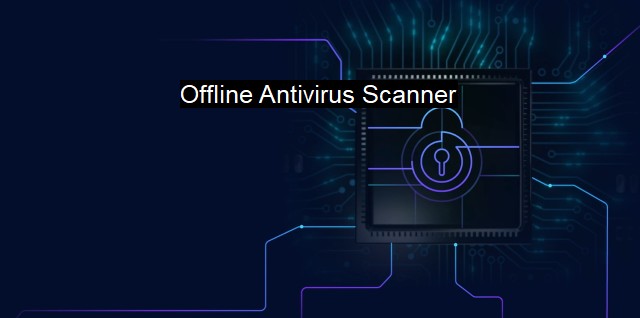What is Offline Antivirus Scanner?
Strengthening Your Cybersecurity Strategy with Offline Antivirus Scanners: The Benefits and Significance for Individuals and Organizations
Offline antivirus scanners constitute an integral component in our ongoing battle to secure computer systems from potential harmful software, capable of causing not only significant harm to the device itself but potentially having far-reaching implications for the software hosted upon it. With growing instances and sophistication of malware, an offline antivirus scanner has become even more critical in the field of cybersecurity.In its simplest form, an offline antivirus scanner is a detection and protection tool that performs its functions without requiring an active internet connection. As a holistic tool, an offline antivirus scanner is developed to scan, identify, and isolate infections in a way that prevents malware from connecting to the internet and potentially downloading additional harmful materials or perpetrating further attacks.
As technology evolves, viruses, malware, and cyber threats have become increasingly sophisticated, exemplified by the sheer ability of certain types to detect and disable the active antivirus programs that one typically employs. In this context, the offline antivirus scanner is essential. Even if a virus somehow manages to cripple the on-board protective features, an offline scanner can still be used to identify and neutralize the threat, functioning effectively as a last line of defense.
Another function offline antivirus scanners serve is in dealing with persistent malware that reactivates upon system reboot. Offline scanners are typically initiated from a bootable external media, like a USB drive or a DVD, enabling them to function effectively even when the computer is not running its primary operating system. By doing so, it makes it harder for the persistent malware to reactivate, hence giving the scanner an upper hand in neutralizing the threat.
The primary characteristic that distinguishes offline scanners from their online counterparts is their independence from an internet connection. Many traditional antivirus tools run on the premise of downloadable virus definition updates, which they employ to ascertain whether a file or program is harmful; frequently requiring an internet connection to keep these virus definitions updated. Conversely, offline scanners do not depend on these updates, thereby rendering them immensely beneficial when disk cleanup is necessary or when the malware blocks internet connection altogether.
In a strategic arena such as cybersecurity, the effectiveness of an offline antivirus scanner depends on the periodicity of its updates. Since these scanners work with what's already in their database, it is crucial to constantly update the CD/DVD/USB from which the scan is carried out to ensure that the scanner reflects the most recent information on identified threats.
Reflecting on the sophistication and pervasive nature of the current threat landscape, a cybersecurity strategy would be incomplete without the capabilities of an offline antivirus scanner. With its ability to operate in situations where its online counterpart may fail or be compromised, an offline antivirus scanner proves an effective tool in both prevention and damage control in the event of a security breach. The offline antivirus scanner thus stands as a sentinel in our cybersecurity measures, backing up our online scanners, and providing an essential safety net when dealing with persistent and pernicious malware that manages to infiltrate and thrive in seemingly protected systems.
Offline antivirus scanners are a fundamental tool in our cybersecurity toolkit. They provide a critical second line of defense against malicious software that online scanners might miss or might even be disabled by. With their standalone functionality, offline antivirus scanners tackle persistent threats, making them an essential failsafe in securing our digital ecosystems.

Offline Antivirus Scanner FAQs
What is an offline antivirus scanner?
An offline antivirus scanner is a type of virus scanner that can be run on a computer without being connected to the internet. It scans the system files and folders for any viruses, malware, or other malicious software.Why is it important to have an offline antivirus scanner?
An offline antivirus scanner is important because it provides an additional layer of protection against malware and viruses. It can be used to scan a computer that may already be infected and can help to remove any malicious software that the regular antivirus may have missed.How do I use an offline antivirus scanner?
To use an offline antivirus scanner, you need to first download the software onto a separate computer and transfer it to the infected computer via a USB drive or other removable storage device. Boot up the computer from the USB drive and run the scanner. Follow the instructions provided by the software to complete the scanning process.Which is the best offline antivirus scanner?
There are several offline antivirus scanners available in the market, each with its own strengths and weaknesses. Some popular ones include Avast Rescue Disk, Kaspersky Rescue Disk, and Bitdefender Rescue CD. The best scanner for you depends on your needs and preferences. It is important to do some research before selecting a scanner to ensure you choose one that meets your requirements.| | A | | | B | | | C | | | D | | | E | | | F | | | G | | | H | | | I | | | J | | | K | | | L | | | M | |
| | N | | | O | | | P | | | Q | | | R | | | S | | | T | | | U | | | V | | | W | | | X | | | Y | | | Z | |
| | 1 | | | 2 | | | 3 | | | 4 | | | 7 | | | 8 | | |||||||